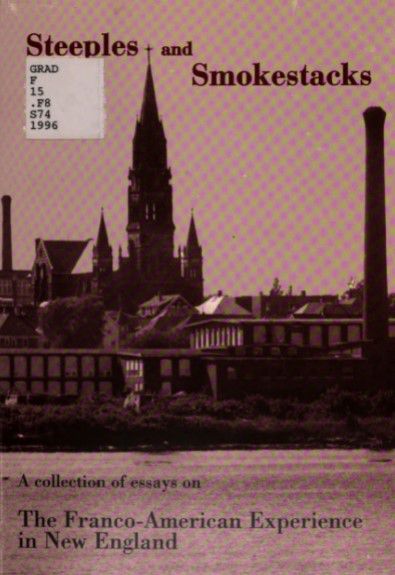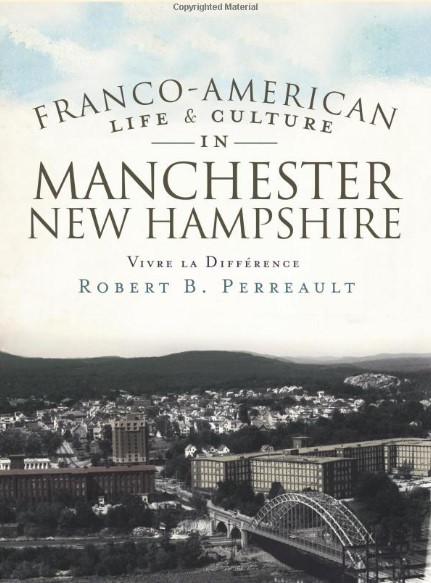Did someone say free?
That’s right, folks, not only free, but also accessible online. It goes without saying that Franco-American history in its many forms has never been so broadly available. We have blogs and podcasts. Primary sources are only a click away thanks to the digitization efforts of platforms like Archive.org, HathiTrust, and Bibliothèque et Archives nationales du Québec and partner institutions. Exceptionally, back issues of certain academic journals are available on Érudit. Theses and dissertations can sometimes be found on university platforms like DigitalCommons.
Where are the published books in all of this? Thankfully, the groundbreaking work of professional researchers is also finding its place in our digital spaces. Below are five relatively recent—by historical standards—studies of French-Canadian migrations and Franco-American communities. Together, they form a strong, reliable starter pack for people looking for a point of entry into the topic. Happy reading!
Yolande Lavoie, L’émigration des Québécois aux États-Unis de 1840 à 1930 (1981)*
In recent historical research, hardly more than a handful of statistical studies of French-Canadian emigration are ever cited. Although more than 50 years old, geographer Ralph Vicero’s dissertation is still a widely used source. We have Gilles Paquet and Wayne Smith’s dramatic reevaluation of emigration flows that appeared in L’Actualité économique in 1983. Bruno Ramirez has since conducted important work on the subject and put English-Canadian mobility in conversation with the French diaspora. We also have more geographically focused works like James Allen’s on Maine.
But perhaps the most trusted work of all is Yolande Lavoie’s L’émigration des Québécois, a study that grew out of her prior research, titled L’émigration des Canadiens aux États-Unis avant 1930: Mesure du phénomène (1972). Her second book includes statistical tables reaching all the way back to the 1840s; they are derived from different source bases and accompanied by short explanations. The study remains a standard.
*If the link doesn’t work, which happens regularly on this government website, the book may alternatively be accessed on Archive.org.

This impressive collection is the end product of approximately fifteen years’ worth of colloquia at the French Institut at Assumption College (now Assumption University, in Worcester, Massachusetts). Essays from the many conferences held at the Institute were previously published in separate volumes, each organized around a specific theme. Director Claire Quintal brought those studies together as Steeples and Smokestacks, which includes papers by some of the most influential figures of the 1980s and 1990s—academics and amateur historians, men and women, Franco-Americans and fellow travelers. When published, this volume represented cutting-edge research in bite-sized form (many essays are under 20 pages in length). Research has progressed since then, but this remains a powerful overview of topics in Franco-American history.
Many titles in the Culture française d’Amérique series are fully available online—so we have the embarrassment of riches here. This specific book merits mention not simply because of the distinguished scholar, Roby, who more than merited a festschrift. This collection includes texts about Quebec and Franco-American history, particularly novel research that would appear in expanded form in subsequent years, e.g. Jean Lamarre’s Les Canadiens français et la guerre de Sécession. Far from simply looking back on recent decades of historical research, the contributors sought to push the frontier of knowledge and the end product can still serve as a guide. I would especially encourage readers to check out J.-André Sénécal’s essay on Franco politics (and on the little-known Benjamin Lenthier) and Brigitte Violette’s work on the development of a permanent Franco-American middle class in southern New England.

To many readers here, Robert Perreault needs no introduction. Beyond his creative writing, he has been involved in the preservation and dissemination of Manchester’s Franco-American history since the 1970s. This book certifies Manchester’s place as one of the “Crown Jewels” of Franco-American industrial cities.
The chapters of this local history are essays which in some cases previously appeared elsewhere; Perreault molded them into a cohesive whole that tackles Manchester’s Franco community from different angles. He provides insight through the artistic and literary work of Ulric Bourgeois and Grace Metalious, but also through his own years of research, walking tours, and experience in oral interviews.
One of the book’s main virtues is its accessibility. It does not have the academic flair of other works listed here; the writing is limpid and enlivened by a great many images.
Perreault’s book can be borrowed virtually for an hour or for two weeks all depending on availability; one simply needs to create an account and log in. The site is also a great resource for primary sources.
Yves Frenette, Etienne Rivard, and Marc St-Hilaire, ed., La francophonie nord-américaine (2012)
From the most geographically narrow work, we move to the broadest. Covering migrations and communities from the colonial era to the twentieth century, this collection also stretches from Acadia in the Maritimes to California and from the Canadian Prairies to contemporary Louisiana. In short, it offers context for other works that tend to confine the Franco-American story to the New England states. Béatrice Craig discusses the Madawaska region; Jack Little tackles expansion from the old St. Lawrence oikumene into the Eastern Townships; experts like Cécile Vidal explore the Mississippi Valley. In short, we’re treated to brief, well-sourced introductions to French North America from prominent scholars. The visual appeal adds to the experience: the texts are enriched with pictures, charts, and clear, elegant maps.
Postscript: Though these five works are not meant as a comprehensive listing and, instead, serve as a point of entry into the topic, I happily encourage everyone to check out the great work coming out of Salem State University, including translations of important studies of Franco-American life in Southbridge and Salem, Massachusetts. This is a wonderful example of academic institutions’ digitization projects that I alluded to in the introduction.
* * *
For more resources, consider checking out the following:
- Internet Resources on Franco-American History
- Resources: Monographs and Surveys of Franco-American History
- Resources: Scholarly Journal Articles on Franco-American History
My “Tout nous serait possible”: Une histoire politique des Franco-Américains, 1874-1945 is still available for a low, low price from the Presses de l’Université Laval.
Pingback: Online books on Franco-American history - Genealogy à la carteGenealogy à la carte
Greetings from Australia…thank you so much for this material which I will explore. My grandfather came from Swanton, Vermont to Downunder in 1907. Joined Australian Army WW1 and identified himself as ‘French Canadian’ . He married a Lutheran and that is another story. But it was his father who came from Quebec. So appreciate your resources and academic writings. Best wishes in your work.